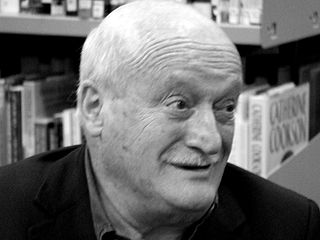A Quote by Andrei Tarkovsky
Modern mass culture, aimed at the "consumer", the civilisation of prosthetics, is crippling people's souls, setting up barriers between man and the crucial questions of his existence, his consciousness of himself as a spiritual being.
Related Quotes
The freedom of an individual depends upon that individual's freedom to alter his considerations of space, energy, time and life and his roles in it. If he cannot change his mind about these, he is then fixed and enslaved amidst barriers such as those of the physical universe, and barriers of his own creation. Man thus is seen to be enslaved by barriers of his own creation. He creates these barriers himself, or by agreeing with things which hold these barriers to be actual.
Before modern man can gain control over the forces that now threaten his very existence, he must resume possession of himself. This sets the chief mission for the city of the future: that of creating a visible regional and civic structure, designed to make man at home with his deeper self and his larger world, attached to images of human nature and love.
A Buddha is not a man of concentration, he is a man of awareness. He has not been trying to narrow down his consciousness; on the contrary, he has been trying to drop all barriers so that he becomes totally available to existence. Watch... existence is simultaneous. I am speaking here and the traffic noise is simultaneous. The train, the birds the wind blowing through the trees - in this moment the whole of existence converges. You listening to me, I speaking to you, and millions of things going on - it is tremendously rich.
Private property is a natural fruit of labor, a product of intense activity of man, acquired through his energetic determination to ensure and develop with his own strength his own existence and that of his family, and to create for himself and his own an existence of just freedom, not only economic, but also political, cultural and religious.
The natural inclination of man is to rely solely upon himself and to ignore the purpose of his existence as well as his relationship to God who is his spiritual father. If man will recognize his divine origin, he will then realize his Heavenly Father will not leave him alone to grope in darkness of mind and spirit, but will make available a power to influence him in right paths and into standards of good behavior. The Holy Ghost is that power.
The progressive growth of the finite consciousness of man towards this Self, towards the universal , the eternal, the infinite, in a word his growth into spiritual consciousness by the development of his ordinary ignorant natural being into an illumined divine nature, this is for Indian thinking the significance of life and the aim of human existance.
This leads us to note down in our psychological chart of the mass-man of today two fundamental traits: the free expansion of his vital desires, and, therefore, of his personality; and his radical ingratitude towards all that has made possible the ease of his existence. These traits together make up the well-known psychology of the spoilt child.
[T]he mass-man sees in the State an anonymous power, and feeling himself, like it, anonymous, he believes that the State is something of his own. Suppose that in the public life of a country some difficulty, conflict, or problem presents itself, the mass-man will tend to demand that the State intervene immediately and undertake a solution directly with its immense and unassailable resources. This is the gravest danger that to-day threatens civilisation: State intervention; the absorption of all spontaneous social effort by the State.
No technological achievements can mitigate the disappointment of modern man, his loneliness, his feeling of inferiority, and his fear of war, revolution and terror. Not only has our generation lost faith in Providence but also in man himself, in his institutions and often in those who are nearest to him.
Mass democracy, mass morality and the mass media thrive independently of the individual, who joins them only at the cost of at least a partial perversion of his instincts and insights. He pays for his social ease with what used to be called his soul - his discriminations, his uniqueness, his psychic energy, his self.
Just getting totally absorbed in that and therefore when I came back around to [Buckminster Fuller] and found that much of it was made up, I realized that nevertheless, it really was crucial, crucial for how he understood himself, I believe, and certainly crucial for how anyone else ever engaged in his ideas and therefore as a starting point, how can we engage in his ideas today, but with a remove of knowing that it is a myth and being able to navigate it in that sort of level, at that level of reading him as a story.
Mary adored Jesus as the Bridegroom of souls. Union is the final purpose of love. Jesus by the gift of His substance in the Eucharist unites Himself with our souls as with His dear spouses. As a Bridegroom, He gives them all His possessions, His name, His heart, His whole Self, but on the condition that the soul reciprocates. The soul, His spouse, shall live for Him only





































